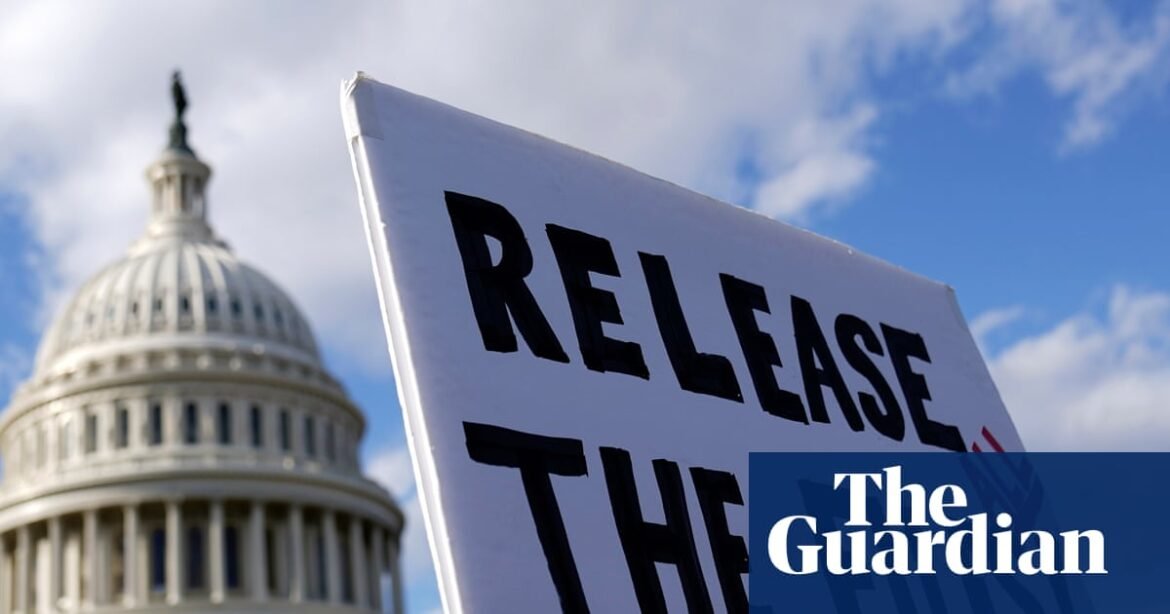The intensively discussed files into the disgraced former financier and sex trafficker Jeffrey Epstein passed a significant milestone on Tuesday when representatives on Capitol Hill voted overwhelmingly in favor of releasing them.
After months of deliberate delays and manoeuvres, the House of Representatives voted by 427 to one in favor of the Epstein Files Transparency Act, legislation which would, if enacted, require the justice department to release all unclassified materials on Epstein, who died in jail in 2019 while awaiting trial on sex-trafficking charges.
Tuesday’s sweeping vote was rendered all but inevitable after Donald Trump on Sunday reversed himself and called for the release of the files, declaring “we have nothing to hide” and labelling the controversy over the files a “Democrat hoax”.
Trump’s volte-face followed the failure of intense White House efforts to persuade two female Republican members of Congress, Lauren Boebert and Nancy Mace, to withdraw their names from a discharge petition to force the House speaker, Mike Johnson, to hold a floor vote on releasing the files.
Faced with the prospect of numerous Republicans defying his wishes by voting with Democrats in favor of releasing the files, the president decided to cut his losses by bowing to the inevitable. Before Trump changed his tune on the files, Thomas Massie, the maverick Republican representative from Kentucky – who had co-sponsored the discharge petition along with Democrat Ro Khanna – had predicted that 100 Republicans would vote for release.
In the event, Trump’s green light appeared to have the effect of freeing even more GOP representatives of their previous inhibitions against joining all 214 House Democrats. Clay Higgins of Louisiana, a close Trump ally, was the sole member of the House to vote against the measure; five representatives did not vote.
Will the passage of the bill in the House mean the files finally see the light of day?
Not yet. The bill has to go before the Senate, where the Republican majority leader, John Thune, on Tuesday indicated it would be addressed with some urgency. “My assumption is that the president sounds like he’s prepared to sign it, so I’d assume we’ll move fairly quickly over here,” Thune told reporters.
What is the Senate expected to do?
It is unclear. Chuck Schumer, the Democratic leader in the Senate, said he would try to force a vote on the bill passed by the House “immediately.”
He may encounter resistance. John Barrasso, the Republican majority whip, promised at the weekend to “take a look” at the bill in the event that it passed the House. But in a sign that partisan political considerations were still very much in play, he told NBC’s Meet The Press that he considered the Democrats to be more interested in turning Trump into “a lame duck president” than achieving “accountability and transparency”.
But the overwhelming House vote may force the Senate’s hand – and Thune suggested on Tuesday that the Senate was unlikely to amend the House’s version of the bill.
Would that result in the Senate passing it?
It is far from inevitable. Sixty out of the chamber’s 100 senators would need to back it, to overcome the Senate’s filibuster rule.
Assuming all 47 Democratic-aligned senators vote in favor, 13 Republicans would be needed to assure passage.
Would Trump then sign it?
Trump told reporters on Monday that he would sign the bill if it arrives on his desk. Yet despite this pledge and his late U-turn on releasing the files, Trump could still use his presidential veto power to block passage – though doing so at such a late stage would surely fan suspicions that he has something to hide.
Could such a veto be overcome?
Yes. A presidential veto can be overridden if both chambers vote to do so by a two-thirds majority. The House has already surpassed that in spectacular fashion. But what happens in the Senate may be a different matter.
What cards can Trump play if overwhelming congressional votes compel the justice department to make the files public?
Even if Trump signs the bill – whether of his own volition or by force because House and Senate majorities override his veto – his recent announcement of a justice department investigation into prominent figures (other than himself) mentioned in last week’s trove of Epstein emails released by the House oversight committee have fueled fears that any version of the files released could be incomplete or selective.
Last Friday, Trump instructed the US attorney general, Pam Bondi, to open an investigation into links between Epstein and former president Bill Clinton, Larry Summers, a former US treasury secretary and ex-president of Harvard University, Reid Hoffman, a venture capitalist noted for funding Democrats and liberal causes, and the bank JPMorgan Chase. The investigation could enable the justice department to withhold certain documents on the argument that releasing them would be prejudicial.
In the final analysis, Trump could end all uncertainty by ordering the files to be released now regardless of what Congress does.

